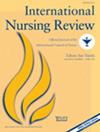Teamwork, psychological detachment from work during nonwork time, and burnout experienced by hospital-based nurses
Abstract
Aims
To assess the relationships in nursing teamwork, psychological detachment from work during nonwork time, and burnout, and the mediating effect of psychological detachment on the relationship between nursing teamwork and burnout.
Background
Nurse burnout has serious implications for nurses’ health and performance and the overall functioning of their organizations. Evidence on the relationships between nursing teamwork, psychological detachment, and nurse burnout is limited. This study adds to the international body of knowledge by examining the interplay between nursing teamwork, psychological detachment, and burnout in nurses, a topic of global relevance.
Methods
This cross-sectional study used survey data collected in May 2021 from 1115 Korean hospital nurses. The measurements included the Nursing Teamwork Survey, a subscale of the Recovery Experience Questionnaire, and the Copenhagen Burnout Inventory. We performed mediation analysis using PROCESS Macro based on 5000 bootstrapped samples to estimate the indirect effect of nursing teamwork.
Results
Nurses in units with stronger teamwork were more likely to report being psychologically detached from work during nonwork time. Nurses who distanced themselves from work-related thoughts during nonwork time reported lower personal, work-related, and patient-related burnout. Nursing teamwork had significant indirect effects on each burnout outcome through psychological detachment.
Conclusion
By providing empirical evidence on the associations between nursing teamwork, psychological detachment, and burnout, this study enriches the international discourse on nurse burnout and the benefits of psychological detachment. Enhanced nursing teamwork can facilitate nurses’ mental distance from work during nonwork time, thereby reducing burnout.
Implications for nursing and nursing policy
Organizational efforts to manage nurse burnout can include increasing nursing teamwork among nurses and improving nurses’ psychological detachment during nonwork hours. Interventions should include improving nursing teamwork and developing a supportive and collaborative unit culture.

 求助内容:
求助内容: 应助结果提醒方式:
应助结果提醒方式:


